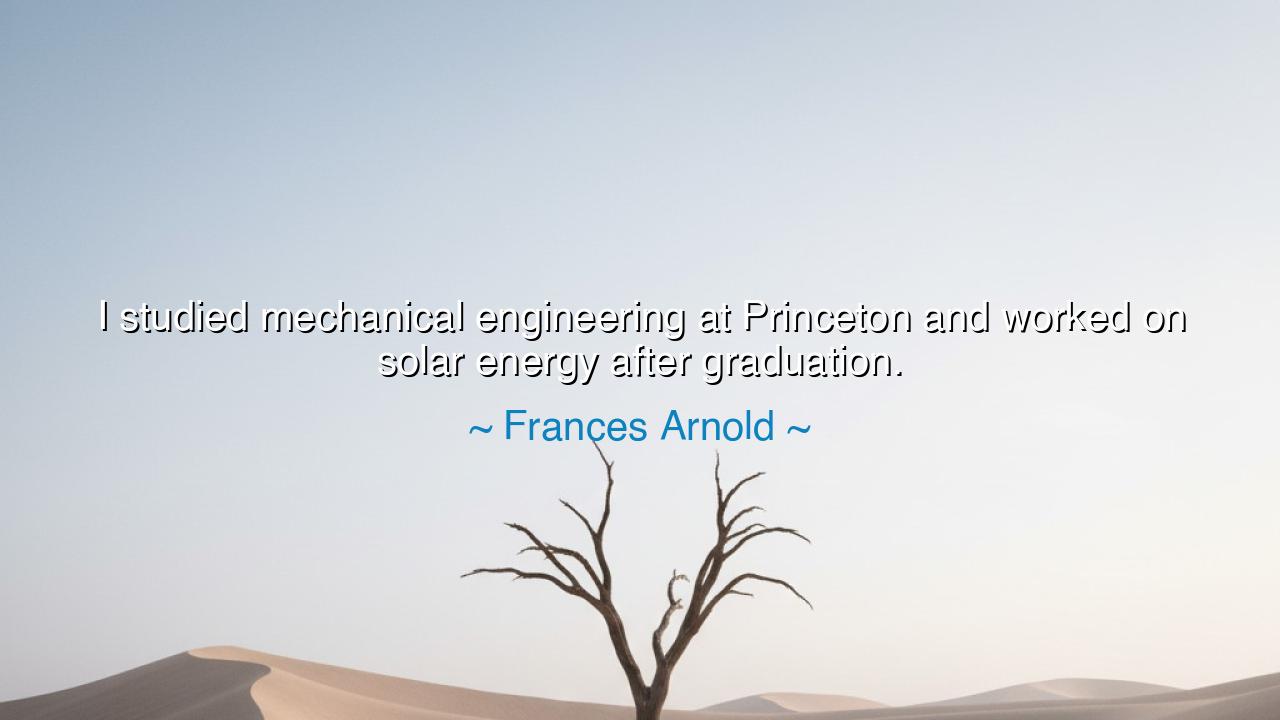
I studied mechanical engineering at Princeton and worked on solar
I studied mechanical engineering at Princeton and worked on solar energy after graduation.






The Nobel laureate and pioneering scientist Frances Arnold once reflected on her beginnings with these words: “I studied mechanical engineering at Princeton and worked on solar energy after graduation.” At first glance, her statement seems factual, modest, even simple. Yet beneath those few words lies the origin of a philosophy — the seed of a life devoted to innovation, perseverance, and the transformation of energy, both physical and human. Her words are not only about the study of machines or sunlight; they are about the discipline of creation, the devotion to learning how the world works so that one may one day improve it.
To study mechanical engineering at Princeton is to enter the temple of precision, logic, and disciplined thought. It is the realm where mind and matter meet — where human curiosity learns to speak the language of motion, force, and form. But Frances Arnold did more than study; she absorbed the sacred order of nature, the way energy flows, the way structure supports purpose. For the ancients, the mastery of mechanics was not merely an academic pursuit — it was a form of reverence. The engineers of old, from Archimedes of Syracuse to the builders of the pyramids, understood that to build something enduring, one must first understand the laws of balance — both in material and in spirit. Arnold’s early education, then, was not merely a path to a career, but the foundation of wisdom through structure.
Her choice to work on solar energy after graduation holds a poetic and symbolic resonance. For in turning toward solar energy, she turned toward the source of all life and renewal — the sun, the ancient emblem of inspiration and creation. To study solar energy is to seek a way to harness the very fire that sustains existence. It reveals a spirit that looks not inward toward comfort, but outward toward contribution. In this decision lies the timeless truth: that learning finds its nobility not in accumulation, but in application — in turning knowledge into light for the world. Frances Arnold’s work was not only scientific, it was spiritual in purpose, a continuation of humanity’s eternal quest to transform nature’s gifts into tools of progress and hope.
Her journey mirrors that of countless visionaries who began in one field only to transcend it. Consider Leonardo da Vinci, who began as an apprentice engineer and artist but came to understand that the boundary between art, science, and invention is an illusion. Or Nikola Tesla, who devoted his life to the study of energy — not to possess it, but to free it for all mankind. Like them, Arnold’s path from mechanical systems to living systems reflects a mind that refuses confinement, one that seeks patterns and unity in all things. Her later revolution in directed evolution, for which she earned the Nobel Prize, grew from the same roots — the belief that energy, whether solar or biological, must be guided with intelligence and compassion toward creation, not destruction.
Her words also speak quietly of humility. In recounting her education and early work, she makes no mention of her later triumphs — only of her beginnings. This humility is the mark of the true scientist and the true sage: those who understand that all greatness begins in learning, and all learning begins in curiosity. The ancients called this phronesis — practical wisdom, born not of pride but of experience. It is the kind of wisdom that teaches one to look upon the sun not as a symbol of self-glory, but as a reminder of life’s vastness — of how small we are, and yet how capable of channeling great forces for good.
The lesson, then, is clear and enduring: begin with discipline, but let your purpose expand beyond yourself. The mind that studies is sacred, but the heart that serves is divine. Whatever your field — whether mechanical, artistic, or spiritual — seek to connect it with the greater whole. Learn deeply, but never let your learning end with you. Frances Arnold reminds us that education is not a destination but a foundation, and that true mastery lies in using knowledge to nurture life, to bring light to others, and to heal the earth that sustains us.
And so, let the words of Frances Arnold be remembered not as a mere recollection of career steps, but as a parable for all who aspire to meaningful creation: “I studied mechanical engineering at Princeton and worked on solar energy after graduation.” For the sun she studied is the same sun that burns within the human spirit — a force of brilliance waiting to be transformed into purpose. To follow her example is to understand that every act of learning can become an act of light, and every human life, if devoted to wisdom and compassion, can become a source of energy that warms the world long after it has passed.






AAdministratorAdministrator
Welcome, honored guests. Please leave a comment, we will respond soon